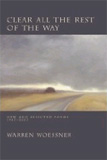 Review by Alexa Mergen
Review by Alexa Mergen
The Backwaters Press
3502 N 52nd Street
Omaha, NE 68104-3506
ISBN 978-0-9793934-4-0
2008, 92 pp., $16.00
http://www.thebackwaterspress.com/
We’ve stopped waiting
for big breaks, know how
the little ones add up
into six lives spent
mostly in art, sometimes
at our best.
These lines, from the poem “Rendezvous,” summarize Woessner’s approach to his art as evidenced in this collection selected from 20 years of work. Like “Rendezvous,” originally published in Heartlands Today and one of the final poems in the concluding section called “Flyways,” the poems in Clear All the Rest of the Way feel personal and generous, as if Woessner is acknowledging friends in this collection (including the places and birds he has known) and inviting readers to gather “around the lost library table.” He dedicates the collection to the poet David Hilton and the first poem is “Letter to Hilton from Madison”:
Dear Dave, It’s Saturday. The light
that never got to work is falling down
drunk on a stormy afternoon.
The two plum trees are in bloom
and shaking with wind and life.
The tulip patch which half-opened last week
is folding up like a church bazaar
caught in the rain.
Even the cat won’t go out today.
The roof leaks some.
The drops falling on a rag in a pot
sound like a hot engine cooling down.
Miles just finished blowing “Round About Midnight.”
I’m not sure if I’m lonely,
but I’m going to stick around and find out.
Maybe I’ll write some letters,
maybe some poems. Love, Warren.
Most of the poems are written in the first person and carry the natural authority of autobiography. Yet the “I” in the poems takes a back seat, functioning as a reporter as in “Lessons,” which narrates a ride Woessner takes with a taxi driver whose daughter is riding shotgun so her father can quiz her on her English while he works. Woessner compares the car to a ship the immigrant father will keep afloat.
Other poems in the section “Blue as Hell” reveal how moving to a place–in Woessner’s case from the Midwest to New York City–can stimulate poems. He notices birds in the city and listens as well as observes. Central Park inspires as a place where birds and people meet. He references jazz throughout his poems–Coltrane, Davis, Marsalis–and his poems have the feel of improvisation as he riffs on observations he makes. In lesser hands this can lead to stale images and triteness; Woessner’s clean, simple language and honest approach keep things fresh. His titles tend to be short, one word or two, or drawn from dialogue.
Woessner controls his poems with a craftsman-like approach to line breaks using sound to his advantage as in “The broad-wings come riding down/a fine northeast wind” from “Hawk Ridge.” In this second section, “N N W – N – N N E,” Woessner takes the reader north to Alaska. Here some of the poems are less strong with less original lines such as “Tourists/graze through gift shops” in “Nome” or “bleached wood markers/shimmer in an old native graveyard” in “Point Barrow.” These are the poems of a traveler with the feel of journal entries, no less true for the poet, perhaps, but less striking for the reader. There is also the puzzling spelling of “reindeer” as “raindeer” in “Pribilof Islands.”
The collection picks up power again in the final section, “Flyways,” where the first poem, “Our Hawk,” skillfully draws a comparison between a hawk hunting rodents and Woessner hunting information for his ill friends. In this section, Woessner fully reveals his love of birding and of the skies the birds inhabit. Some of the poems are beautiful and beg to be read aloud such as:
Yahara River Vision
Thousands of blackbirds rose up
all at once, hung a second
caught in their own wind
then settled back into the reeds;
the sound of all the words
we lose in dreams.
Clear All the Rest of the Way collects poems into a narrative of a life. The poems are best read straight through so that–as with tracks on an album–-stronger poems carry the reader through those that seem weaker in isolation but are in fact part of the whole. Skillful arrangement of the poems allows the collection to stand as is, but the reader might have benefited from a brief introduction by Woessner who holds degrees in chemistry and law and works as a biotechnology patent attorney. All in all, Clear All the Rest of the Way is a keeper.